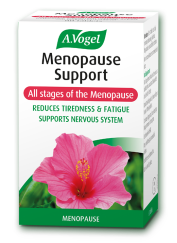And introduction to hair loss and menopause
Many women suffer from hair loss when going through the menopause. Every person naturally loses between 50 and 100 hairs a day. If you begin to lose more than this, you may notice areas of baldness on your scalp, clumps of hair coming out when you wash or brush your hair, or thinning of hair around the front and sides of your scalp.
Hair is made from keratin, the same material as nails. This is produced by cell structures known as hair follicles lying beneath the scalp and the hair that people wash, brush and style is actually the dead secretions from these follicles. Individual strands of hair can stay on the head for up to six years before falling out.
Why does menopause cause hair loss?
Although most people wouldn’t automatically think of hair loss as a menopause symptom, the hormonal changes which the menopause causes can have all sorts of unexpected effects on the body.
The hormones oestrogen and testosterone have the most important influence on hair growth. During the menopause, levels of oestrogen decrease. This hormone is important for promoting hair growth. While oestrogen levels drop, testosterone levels increase disproportionately. This causes the hair that does grow to be thinner than before, and can also cause facial hair.
However, there are other causes of hair loss. These include factors as simple as what you eat to more serious issues such as stress, certain illnesses and medication. It is important to get to the root of the problem in order to find the most effective treatment.
Diet, lifestyle and home remedies for hair loss
There are few women who would be willing to sit back and watch their hair fall out. Instead, a number of home remedies can be employed alongside herbal or conventional remedies to make sure that your hair is kept as healthy as possible.
- Be nice to your hair. Use gentle shampoo when you wash it and try to avoid tugging and tangling it. Dying it regularly can cause hair to become unhealthy and more likely to fall out. A scalp massage can stimulate extra blood flow to the scalp, which may prevent further hair loss
- There are certain foods which can improve the quality of your hair. Protein and iron rich foods (found in red meats) are good for strengthening your hair. Vitamin C, found in citrus and other fruit, is also beneficial, not least for helping you to absorb iron into your bloodstream
- Keep stress to a minimum. This will also help you sleep well at night, reducing another factor which might cause you to lose your hair. Exercise will help reduce stress, improve sleep and circulation of blood to the scalp to help you keep your hair on.
Are there herbal remedies to help me?
If your hair loss is the result of hormonal changes caused by the menopause, using a soy based supplement such as our Menopause Support supplement may be effective. This tackles all stages of the menopause, as it contains soy isoflavones which naturally mimic the effect of oestrogen in the body.
![]() "Menopause support tablets have eased my problems and have helped me sleep better at night. I would recommend them to any one suffering the effects of the menopause."
"Menopause support tablets have eased my problems and have helped me sleep better at night. I would recommend them to any one suffering the effects of the menopause."![]()
Stress at this time of your life will not help improve your head of hair, so if you feel you are not coping, face up this issue rather than ignore it. You can also try our Stress Relief Daytime, which can help ease stress and relieve mild anxiety.
If you think your hair loss is caused by medication, seek help and advice from your doctor.
What about conventional medicine?
There is a range of hair loss treatments that a doctor may prescribe or recommend to help with your symptom.
If the menopause is the cause of your hair loss, your doctor may ask you to consider taking HRT. However, it is important to understand the benefits and side-effects of this treatment.
If you are worried about your condition or and concerned that it may be caused by an underlying health condition, seek medical advice.








